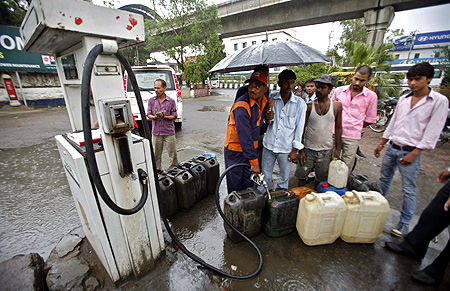New Delhi’s handling of the post-May 2009 situation has been a case of one faux pas after another, says B Raman
Is there a neo-LTTE group emerging nearly four years after the Liberation Tigers of Tamil Eelam was wiped out by the Sri Lankan security forces?
This question needs the attention of the intelligence agencies in the wake of the growing support for the Sri Lankan Tamils’ political and human rights in the Sri Lankan Tamil Diaspora and among large sections of the international community.
India had reasons to be gratified with the total elimination of the LTTE, which had become a Frankenstein’s monster, by the Sri Lankan security forces. Indian intelligence and security agencies had played an active but low-profile role in helping in the counter-LTTE operations of the Sri Lankan security forces through means such as exchange of intelligence, monitoring the movement of LTTE's commercial ships used for smuggling arms and ammunition, strengthening the anti-aircraft defence of the Sri Lankan forces, training etc.
While one has to concede that the uprooting of the LTTE was largely due to the excellent counter-insurgency operations of the Sri Lankan security forces, the ‘un-admitted’ contribution of India was not insignificant.
While the governments of India and Sri Lanka were on the same wavelength before the elimination of the LTTE in May 2009, nagging differences cropped up later due to various reasons.
Firstly, the government of President Mahinda Rajapaksa sought to impose a dictated peace on the Sri Lankan Tamil population in total breach of the various promises regarding political accommodation which the Rajapaksa government and its predecessors had made over a period of years. India’s counter-insurgency help to Sri Lanka was in the expectation that the government of the island nation would implement these commitments.
Secondly, after the operations against the LTTE were over, evidence, at least some of it credible, started emerging regarding alleged disproportionate use of force by the Sri Lankan security forces not only against the LTTE, but also against the civilian Tamil population living in areas controlled by the outfit.
Instead of addressing these complaints and taking corrective action where required, the Rajapaksa government started dragging its feet in the matter. Backed by countries like China and Pakistan, it became increasingly indifferent to nudgings -- from the United States, the European Union and even India -- to attend to these complaints before they became a major international issue.
Thirdly, one found that the admiration of the world for the successful counter-insurgency operations of the Sri Lankan government gave way to pressures from various quarters for attending to these complaints.
Fourthly, the successful counter-insurgency operations destroyed the LTTE’s support base in Sri Lankan territory, but not among the Sri Lankan Tamil Diaspora abroad. This Diaspora had played a very important role in assisting the LTTE through funds and clandestine supply of arms and ammunition.
After lying low for a while after May 2009, Sri Lankan Tamil political activists in the Diaspora became active once again, providing fresh oxygen to the objective of an independent Tamil Eelam. The unaddressed complaints of serious violations of the human rights of the Sri Lankan Tamils were exploited by these elements -- to give a fresh lease of life to the movement -- with the help of western human rights organisations which exercised pressure on their governments to act against the Rajapaksa administration.
Fifthly, a new generation of activists mushroomed in Tamil Nadu, which acted in tandem with the activists in the Sri Lankan Tamil Diaspora, to revive the Tamil Eelam objective. Growing number of members of GenNext in Tamil Nadu, who had become disillusioned with the opportunistic politics of the traditional Dravidian parties, found themselves attracted to the ranks of neo-Dravidian parties which sought to develop a political base in the state by taking up the cause of the Sri Lankan Tamils and by projecting late LTTE chief Prabakaran as a Tamil icon.
Sixthly, unnerved by the support of GenNext for the neo-Dravidian parties, the traditional Dravidian parties found themselves obliged to indulge in competitive political extremism by taking up the cause of the Sri Lankan Tamils once again.
As a result of all these factors, the government of India and mainstream political parties find themselves confronted with a welter of extremist forces, which have been exploiting legitimate complaints and demands about the human rights of the Tamil community to create a volatile situation across the Tamil belt in India and Sri Lanka.
The situation calls for deft handling by the external affairs and home ministries.
In the past, whenever the Sri Lankan Tamil issue assumed importance in our policy-making, the political leadership in New Delhi had the benefit of sound advice and inputs from the Congress in Tamil Nadu, which had its feet and ears close to the ground in the state as well as the eastern and northern provinces of Sri Lanka.
Today, the Congress is practically non-existent in Tamil Nadu. It has no leader of stature who attracts the GenNext. New Delhi’s handling of the post-May 2009 situation has been a case of one faux pas after another, from one bungling after another. Only India can and should play the leadership role in dealing with the complex situation
Instead of dong so, the Manmohan Singh government has surrendered all political initiative internationally to the US and the EU countries and locally to parties such as the Dravida Munnetra Kazhagam, which are motivated by political opportunism.
If the government of India does not play a more proactive role in this matter, this may give an opportunity to a neo-LTTE group to take over the ground situation.








 © 2025
© 2025